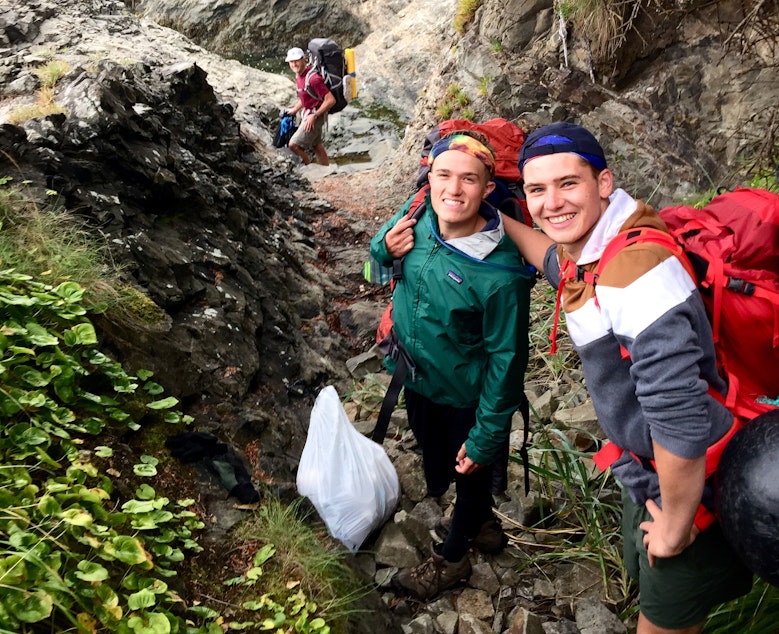These Republicans say they’re green. Can they bridge the environmental divide?

Republicans who care about the environment in Washington State say they find themselves stuck in an uncomfortable spot. Their politics exist between two distant poles: President Trump’s pro-coal proposals and environmental groups historically aligned with Democrats.
Now, some influential Republicans are trying to help conservative college students chart a different course.
Former GOP gubernatorial candidate and port commissioner Bill Bryant is passionate about the Republican legacy on the environment. He points to Teddy Roosevelt, who safeguarded public lands including the Olympic peninsula, and Richard Nixon, who founded the EPA. Last month Bryant tried to renew that spirit by reenacting a hike U.S. Supreme Court Justice William O. Douglas took on the Olympic coast.
“I wanted to take advantage of the fact that this was the 60th anniversary of Justice Douglas’ hike, to have a hike commemorating that and opposing the Trump Administrations’ plans to drill in the national marine sanctuary or adjacent to it,” he said.
Bryant said he intended for his trip to be bipartisan. But then Attorney General Bob Ferguson, a Democrat, announced his own trip instead of joining forces.
“That we had two hikes commemorating Justice Douglas’ hike 60 year ago is a very sad commentary on the state of our politics today,” Bryant said.
Those dueling hikes raised some questions: What does a Republican approach to conservation look like these days? And is there any room for bipartisanship?
One of the people who joined Bryant’s hike was Benji Backer (who protested the Seattle Times' neglect of their event). He’s the University of Washington undergraduate who last year founded the American Conservation Coalition, to promote the idea of “free-market environmentalism.”
“I had worked with so many young conservatives who felt really left behind by the Republican party on these issues,” Backer said. “Because a) They weren’t prioritizing it enough or b) The only issues they heard about from a conservative perspective were actually anti-environment.”
Backer said he grew up visiting national parks. He wants to protect the outdoors, but not through more federal regulations.
“There’s a place for EPA, there’s a place for the Department of the Interior, there’s a place for these types of government agencies,” he said. “But we also think that a lot of times they have overstepped.”
At the UW, Backer happened to become fraternity brothers with Rob McKenna’s son. McKenna, the former state Attorney General, said many Republicans have given up on environmental issues.
"Republicans get tired of being attacked by environmental groups who only support Democrats," McKenna said. "So that makes environmentalists the enemy. And what Benji and his people are saying is, no, we can’t let the cause be the enemy even if we disagree with some of the groups.”
McKenna helped Backer launch the American Conservation Coalition with a string of Washington state connections. The group is endorsed by Republicans Slade Gorton, Dan Evans and Sam Reed. Todd Myers with the Washington Policy Center sits on its board of directors.
The ACC supports the nomination of Brett Kavanaugh for the U.S. Supreme Court. But it opposes Trump administration proposals like clean energy tariffs and shrinking the area for national monuments in Utah.
As a 501(c)4, the ACC does not have to disclose its financial donors. Backer declined to name them, other than the Texas philanthropist Trammel S. Crow, founder of the nonprofit EarthX.
Backer said the ACC does not receive any funding from the Koch brothers’ foundations. However, one of the ACC’s advisors works for the Koch-backed American Legislation Exchange Council or ALEC, which also touts the concept of “free-market environmentalism.”
The ACC has endorsed dozens of Republican congressional candidates for the midterm elections, including Dino Rossi in Washington’s 8th congressional district.
Rossi said he supports renewal of the Land & Water Conservation Fund, as has Rep. Dave Reichert. And Rossi noted that he’s worked on conservation efforts like the Mountain-to-Sound Greenway.
“I’m actually the one who helped assemble good chunks of the Greenway which is why the Washington Conservation voters gave me the Good Green Deeds award twice,” Rossi said.
Those awards are from 2002, however. Washington Conservation Voters president Shannon Murphy said Rossi’s environmental record has declined since then, and his “scorecard” in the state legislature in 2017 was 0%.
Murphy added that her group is nonpartisan, but noted that “in the last few years there are few Republicans willing to stand up to the influence of the fossil fuel industry.” Washington Conservation Voters' national affiliate, the League of Conservation Voters, recently endorsed Rossi’s opponent, Democrat Kim Schrier.
But some groups, including the National Audobon Society and the Environmental Defense Fund, have welcomed the new Republican-oriented effort.
Jeremy Symons is the Environmental Defense Fund’s vice president for political affairs.
“The biggest single barrier to action on climate change in the United states is the fact that it has become too much of a partisan issue,” he said.
Symons said there’s plenty of room to collaborate with a group like the American Conservation Coalition.
“Conservatives and liberals aren’t going to agree out of the gate on how you solve a problem like climate change,” he said. "But there’s actually a lot more common ground than you would think, particularly when it comes to clean energy. “
Back on the Olympic coast, Bryant said his group came across so much plastic trash that they turned it into a cleanup mission. Backer points to the phase-out of plastic bags by the grocery company Kroger as the type of private-sector solution that his group supports.
In a recent column Backer called bans on drinking straws “asinine and unnecessary,” but he also scolded Republicans for reveling in rancor without offering solutions.
“Instead of vowing to use more straws, we should make the personal choice to limit use of them and other single-use plastics while turning to more sustainable, reusable products,” he said.




